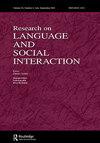在语法和身体的界面:Chais pas(“不知道”)作为处理接受者缺乏回应的资源
IF 2.1
1区 文学
Q1 COMMUNICATION
引用次数: 26
摘要
这篇文章研究了说话者在发现他们的顺序初始回合没有得到接受者的回应时使用法语chais pas(“不知道”)的情况(大致如下:说话者A:也许他们正在攻读硕士学位;说话者乙:[没有回应];说话者A:不知道)。在这个精确的顺序位置记录了两种相互作用的工作:说话者使用链传递来撤回他们刚刚产生的顺序初始动作,从而取消响应的相关性,或者相反,在放松对精确类型响应的偏好的同时追求响应。基于集合的分析表明,这些使用在具体交付方面有所不同,实现了具有不同顺序结果的不同交互工作。这些发现增加了我们对语法和身体如何在实时产生回合和动作的过程中相互作用的理解,并为动作投射的在线可塑性提供了证据。资料为法文,并附有英文翻译。本文章由计算机程序翻译,如有差异,请以英文原文为准。
At the Interface of Grammar and the Body: Chais pas (“dunno”) as a Resource for Dealing with Lack of Recipient Response
ABSTRACT This article examines speakers’ use of French chais pas (“dunno”) when they find that their sequence-initial turn has not been responded to by their recipient (roughly: Speaker A: Maybe they’re doing a master’s degree; Speaker B: [no response]; Speaker A: Dunno). Two interactional workings are documented in this precise sequential location: Speakers use chais pas either for withdrawing their just-produced sequence-initial action, thereby canceling the relevance of a response or, on the contrary, for pursuing response while relaxing the preference for a precise type of response. Collection-based analysis shows that these uses differ in their embodied delivery, implementing distinct interactional workings with distinct sequential consequentialities. The findings add to our understanding of how grammar and the body interface in the course of the real-time production of turns and actions and provide evidence for the online malleability of action projection. Data are in French with English translations.
求助全文
通过发布文献求助,成功后即可免费获取论文全文。
去求助
来源期刊
CiteScore
7.30
自引率
7.40%
发文量
20
期刊介绍:
The journal publishes the highest quality empirical and theoretical research bearing on language as it is used in interaction. Researchers in communication, discourse analysis, conversation analysis, linguistic anthropology and ethnography are likely to be the most active contributors, but we welcome submission of articles from the broad range of interaction researchers. Published papers will normally involve the close analysis of naturally-occurring interaction. The journal is also open to theoretical essays, and to quantitative studies where these are tied closely to the results of naturalistic observation.

 求助内容:
求助内容: 应助结果提醒方式:
应助结果提醒方式:


